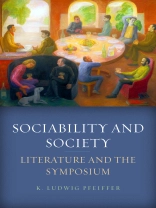Today, churches, political parties, trade unions, and even national sports teams are no guarantee of social solidarity. At a time when these traditional institutions of social cohesion seem increasingly ill-equipped to defend against the disintegration of sociability, K. Ludwig Pfeiffer encourages us to reflect on the cultural and literary history of social gatherings—from the ancient Athenian symposium to its successor forms throughout Western history.
From medieval troubadours to Parisian salons and beyond, Pfeiffer conceptualizes the symposium as an institution of sociability with a central societal function. As such he reinforces a programmatic theoretical move in the sociology of Georg Simmel and builds on theories of social interaction and communication characterized by Max Weber, George Herbert Mead, Jürgen Habermas, Niklas Luhmann, and others. To make his argument, Pfeiffer draws on the work of a range of writers, including Dr. Samuel Johnson and Diderot, Virginia Woolf and Marcel Proust, Dorothy Sayers, Joseph Conrad, and Stieg Larsson. Ultimately, Pfeiffer concludes that if modern societies do not find ways of reinstating elements of the Athenian symposium, especially those relating to its ritualized ease, decency and style of interaction, they will have to cope with increasing violence and decreasing social cohesion.
Cuprins
Introduction
1. Conceptualizing the Symposium
2. Power and Signs of Power in the Middle Ages
3. Sociability and the Humanities
4. The Splintering of Culture: Reading versus Salon
5. Proust and Nineteenth-Century Salons
6. The Silence of Power: English Clubs or Oligarchy versus Democracy
7. A Symptomatology of Critical Shifts
8. Securing Power and Auxiliary Evidence
9. The Paradigm of Isolation and Its Consequences: Joseph Conrad
10. Beyond the Sympotic: Aesthetic Productivity and Sociable Bonding in the Detective Novel
11. Consequences and Conclusion(s): The Anthropological-Institutional Trap and the Resurrection of Literature
Despre autor
K. Ludwig Pfeiffer is Emeritus Professor of English and Comparative Literature at the University of Siegen and at Jacobs University Bremen. He is the author of
The Protoliterary: Steps toward the Anthropology of Culture (Stanford, 2002), in addition to his many books in German.












